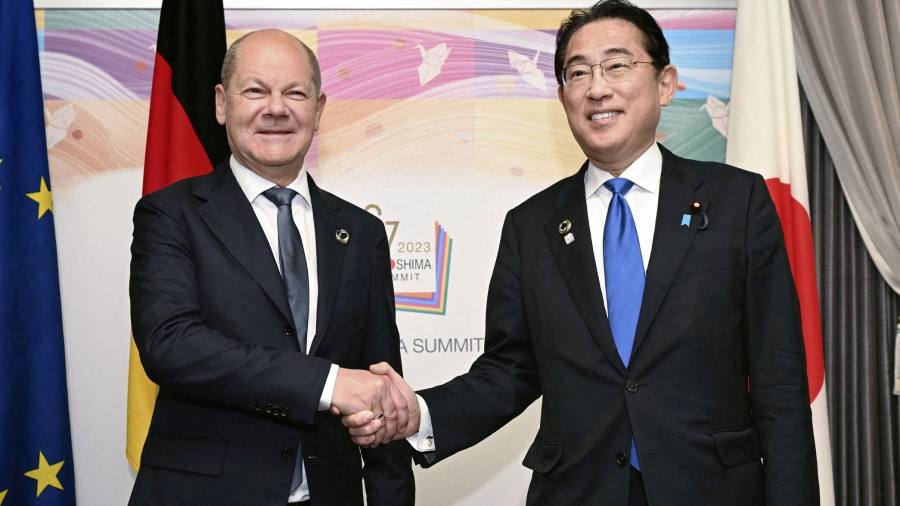Climate experts criticised the G7 group of advanced economies for failing to commit to tougher action on fossil fuels after Germany and Japan prevailed on the continued use of gas and coal respectively.
In their final communique, the leaders of the G7, including the UK, US, France, Italy and Canada, said they were committed to achieving a “fully or predominantly” decarbonised power sector by 2035, and “accelerating” the phaseout of unabated coal power but failed to set a deadline for the latter.
Using the context of the Russian invasion of Ukraine and resulting energy crisis, the G7 also stressed the “important role that increased deliveries of [liquefied natural gas] can play”. It also said that “publicly supported investment in the gas sector can be appropriate as a temporary response” to the crisis.
Alden Meyer, a senior associate at E3G, said Germany’s “insistence on more public investment in gas” and Japan’s “resistance to phasing out coal power” generation “undercut the G7’s leadership at a time when it is desperately needed”.
The lack of a coal phaseout date and the inclusion of the word “predominantly” put Japan behind its peers, as the remaining countries were all taking concrete steps to becoming coal free, E3G said.
The G7 countries had “chosen to remain on a fossil-fuelled collision course,” said May Boeve, executive director of campaign group 350.org. The Climate Action Network, made up of 1,900 civil society organisations, said the “weak commitments, riddled with loopholes” were an “unacceptable disregard to the growing warnings from scientists worldwide”.
The tussle over energy policy among the G7 nations has also led to rising criticism from other poorer climate-vulnerable countries over backtracking by leading economies on their climate targets.
A group of countries led by Chile, the Netherlands and New Zealand had called on the G7 to lead global efforts to phase out fossil fuels and accelerate the rollout of renewables. “We must bring the fossil fuel era to an end,” they said in an open letter released on Friday.
While the G7 energy and environment ministers pledged to decarbonise the power sector by 2035 in talks ahead of the final meeting on Saturday, they were unable to set a timeline for an exit from coal as a result of Japan’s opposition.
The G7 host country is heavily reliant on coal, oil and gas following the 2011 tsunami and Fukushima nuclear disaster, and it has insisted the shift to clean energy must be what it describes as “realistic”.
The leaders said they would work towards “ending the construction” of new unabated coal fired power plants.
The lengthy final communique noted the importance of improving energy efficiency and the need to “significantly accelerate” the rollout of renewable sources.
Fuels such as hydrogen and ammonia were identified as predominantly for use in sectors that were difficult to decarbonise due to their high energy needs, such as heavy industry and transport, the leaders said.
The group backed the adoption of international standards for calculating the carbon intensity of hydrogen. Hydrogen is regarded as “green” when made using renewable energy, however it can also be made using polluting gas and coal.
The G7 also noted that carbon capture and storage technology, which is unproven at scale, could be important for decarbonising heavy industry.
Broad concerns about the security of supply of critical minerals and technology needed for the shift to cleaner energy, and fears that China may seek to dominate, were also reflected in the final communique.
The nations asked the International Energy Agency to make recommendations by the end of the year for how to diversify the supplies of energy, critical minerals and clean energy manufacturing.
The issue of finance for poorer countries to cope with climate change remained outstanding, with the G7 saying it was committed to meeting the goal of deploying $100bn per year in climate finance for developing countries this year. The UN pledge dates back to 2009 and is overdue.
In a reference to China and the oil-rich Middle Eastern countries, the G7 called on nations that “have the capabilities and are not yet among the current providers of international climate finance” to start contributing funds.
Under the UN rules dating back 30 years, countries such as China and Saudi Arabia are classified as developing nations, despite their economic growth since.
On the private sector, the leaders backed the work being done by the International Sustainability Standards Board to draw up climate-related disclosure rules for companies. The ISSB is expected to issue its first set of standards in June. The “important role of high integrity carbon markets and carbon pricing” was also highlighted.
Read the full article here




